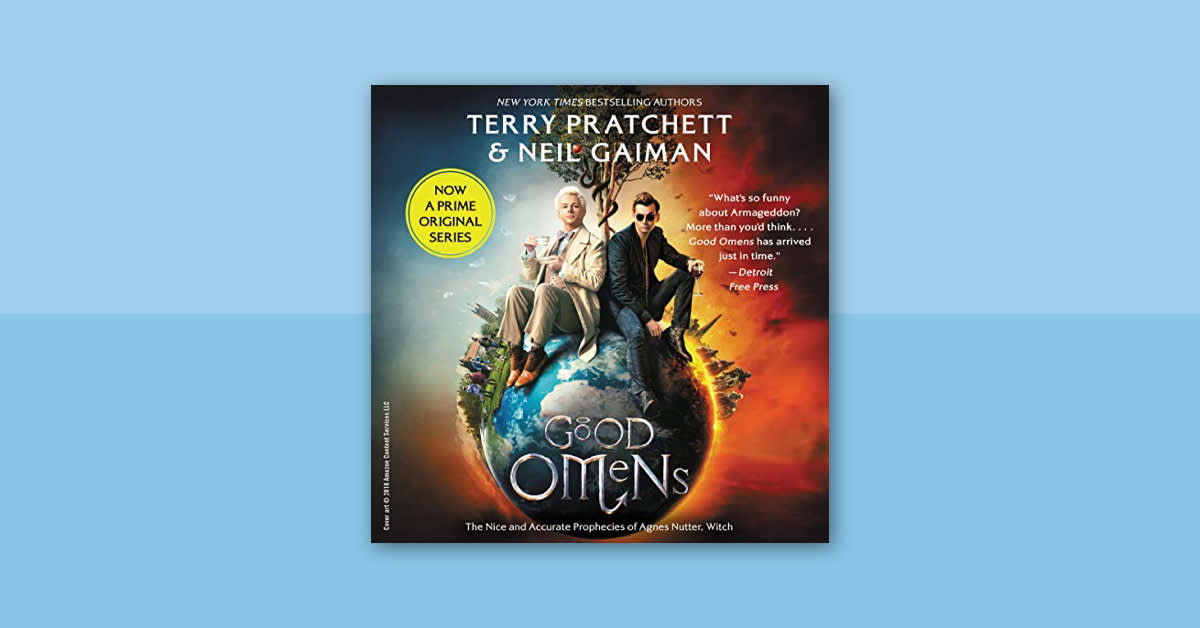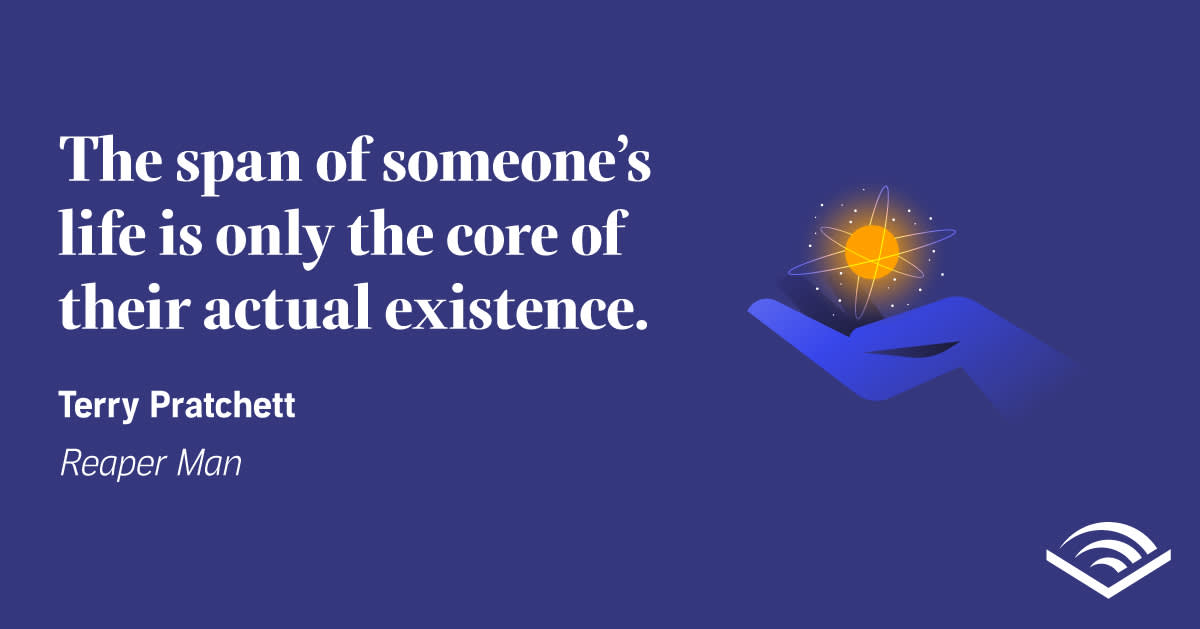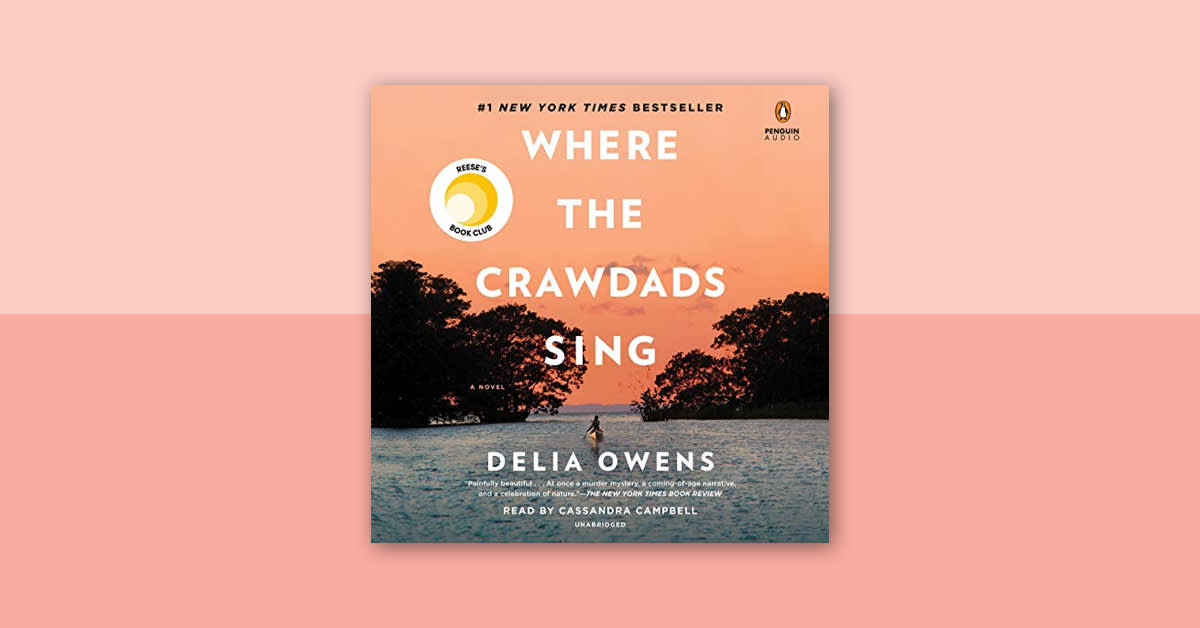Good Omens, a very hilarious (and very British) adult fantasy novel by beloved authors Neil Gaiman and Terry Pratchett, has amassed a large, faithful following over the three decades since it was first published in 1990. And now, thanks to the recent Amazon Prime TV adaptation, Good Omens is more popular than ever. If you're not too familiar with either the book or the show, references to Aziraphale or Agnes Nutter may leave you scratching your head. That's why we're here with everything you need to know about Good Omens: The Nice and Accurate Prophecies of Agnes Nutter, Witch.
A Spoiler-Free Summary of Good Omens
Archangel Aziraphale and archdemon Crowley have known the world would come to an end since they first arrived at the Garden of Eden. Now that the day seems to be right around the corner, the trouble is they've grown quite fond of humanity—and of each other, despite being on opposite sides of the good/evil divide. After centuries of adapting to human life, Crowley is tasked with delivering the infant antichrist to his new home, a sign he recognizes as the start of the apocalypse. Disappointed to see the end of the world come so soon, Aziraphale and Crowley team up to delay the Rapture. But there's one major problem: someone seems to have misplaced the antichrist.
Warning: From here on out, the following article contains spoilers about Good Omens.
What is Good Omens about?
Aziraphale is an angel tasked with guarding the Garden of Eden. Crowley is the demon serpent that tempted Eve. Although they started their run on Earth as adversaries, over the centuries, they've built a strange kind of friendship. Despite everything they've learned, they still can't completely predict the future. But there is one person—or was, before being burned at the stake in 1656—who saw everything coming. Agnes Nutter wrote a book of thousands of prophecies, and every single one has been correct. Yet, they're often so obscure and confusingly written that they're only recognizable after her prediction has come to light.
When Crowley is handed the devil's infant son and instructed to swap him for the newborn baby of an American diplomat, he recognizes it as the first sign of the apocalypse. But having grown somewhat fond of humanity and his role within it, Crowley isn't ready for the grand finale. He teams up with Aziraphale to delay the end of the world by mentoring the young antichrist, influencing him from their roles as a nanny and gardener. But when the child turns 11 and the predictions aren't adding up, Crowley and Aziraphale realize the antichrist was accidentally traded with a different baby. In an effort to track down the devil's child, they return to the satanic nunnery where he was born to ask questions, and they also search intensely for Agnes Nutter's book of predictions.
Meanwhile, Adam Young, the real antichrist, has been living a typical childhood in a small British town. He and his friends collectively call themselves "the Them" and enjoy playing fantastical games in the woods. But after his 11th birthday, Adam starts to develop strange powers that allow him to do things like raise the lost continent of Atlantis and summon UFOs. Recognizing these international mysteries as the beginning of the end, a group of rough-and-tumble bikers assemble as the Four Horsemen of the Apocalypse and attempt to spark a nuclear war by tampering with computer systems.
Crowley and Aziraphale aren't the only two trying to track down Adam. A descendant of Agnes Nutter, Anathema Device has spent her life studying Agnes's predictions and now intends to use her knowledge to stop the apocalypse. She soon teams up with Newton Pulsifer, a descendent of the man responsible for Agnes Nutter's burning at the stake, who is investigating the strange happenings around Adam's town.
As doom impends, Adam has visions of great power and fortune. But thanks to his friends, he's brought back to his senses and decides he must stop the apocalypse instead of inviting it. Adam and his friends defeat the Four Horsemen of the Apocalypse and avert disaster. Sensing a furious Satan coming to Earth, Adam twists Agnes Nutter's predictions to bring his human father in Satan's place and then erases the memories of all humans involved. Crowley, Aziraphale, and humanity live to see another day.
Who wrote Good Omens?
Good Omens was written by Neil Gaiman and Terry Pratchett.
Neil Gaiman is the award-winning, best-selling author of a wide variety of books across age and genre, including sci-fi, fantasy, comics, graphic novels, nonfiction, and more. Some of his best known works include The Sandman, , , and .
Sir Terry Pratchett is also an award-winning, best-selling author, beloved for his humorous fantasy books. He is best known for his Discworld series, which is made up of 41 comedic fantasy novels. Sadly, Pratchett passed away in 2015 after a long struggle with Alzheimer's disease.
While Gaiman and Pratchett are both absolute legends in the world of sci-fi and fantasy, they weren't quite so well known when Good Omens was first released. In 1990, Terry Pratchett was at least eight books into the Discworld series and would go on to become the UK's best-selling author of that decade. Meanwhile Neil Gaiman had only published a couple of biographies at the time; Good Omens was his first novel.
More recent editions of Good Omens feature an interview where Pratchett and Gaiman discuss their collaboration in writing the book. The idea for the novel began as a short story by Neil Gaiman. Friends with Terry Pratchett for several years, Gaiman sent him the story and asked for his input on how to end it. Pratchett called Gaiman about a year later, and said, "I don't know how it ends, but I do know what happens next."
The two authors teamed up to bring Good Omens to life. They talked on the phone daily, brainstormed, shared their most recent writing, and mailed each other floppy disks (it was still the late '80s, after all) until the book was complete. By the time the book was published, both authors claimed they struggled to tell who had written which parts of the book.
Who are the main characters of Good Omens?
Here is a guide to the most important characters you'll find in Good Omens:
• Aziraphale (pronounced ah-ZEER-uh-fell) is an archangel originally assigned to stand guard at the eastern gate of the Garden of Eden. He disguises himself on Earth as a human and has a love/hate relationship with the archdemon Crowley. He is described in the book as intelligent but rather fussy. He owns an antique bookstore, but prefers not to sell his books. While many names in Good Omens are borrowed from the Bible, Aziraphale was created by Pratchett, and the origin of the name is unclear.
• Crowley is the archdemon who first appeared as a serpent in the Garden of Eden to tempt Eve. His name developed from "Crawly," since he crawled in his snake form. His noticeably serpentine eyes remain in his human form, and he often wears designer sunglasses to disguise them. The novel notes that he was an angel who did not so much fall as "saunter vaguely downwards." Although evil, he is described as more of a non-threatening, sarcastic, lazy demon. Over the years, he grows fond of Aziraphale and humanity as a whole. In the book, he drives a 1926 Bentley.
• Adam Young is the son of Satan, aka the antichrist. His arrival as an infant signals the beginning of the apocalypse. Crowley was tasked with exchanging Adam with the newborn son of an American diplomat—but, due to a mixup at the Satanic nunnery, Adam got sent home with a British couple from the fictional town of Tadfield, Oxfordshire. Adam is a curious, imaginative little boy who begins to develop strange powers upon his 11th birthday.
• "The Them" is made up of Adam Young and his three best friends: Pepper, Brian, and Wensleydale. Adam is recognized as the leader of the group, as he comes up with the best games and is a bit bossy.
• The Four Horsemen of the Apocalypse are a quartet of bikers who assemble once Adam Young begins fulfilling the predictions of the end of the world. They are made up of War (a war correspondent), Famine (a dietician), Pollution (who joined when Pestilence retired after the invention of penicillin), and Death (who rides a motorcycle while carrying a scythe). Once united, they seek to start a nuclear war by tampering with computer networks.
• Agnes Nutter is a witch born in 1600 and burned at the stake in 1656. She wrote The Nice and Accurate Prophecies of Agnes Nutter, Witch, which includes thousands of entirely accurate (if nearly impossible to understand) predictions, including those that foresee the apocalypse signaled by Adam Young's arrival.
• Anathema Device is a witch and a descendent of Agnes Nutter. After spending her entire life studying Nutter's prophecies, she sees the signals of the end of the world and seeks to stop it.
• Newton Pulsifer is the descendant of Witchfinder General Pulsifer who was responsible for burning Agnes Nutter at the stake. Newton becomes a reluctant Witchfinder himself after failing as a computer engineer.
• Other demons, includin Beelzebub (a fallen angel/Prince of Hell), Hastur, and Ligur (Dukes of Hell). In the TV series, the angel Gabriel plays a significant role, although he is only mentioned briefly in the book.
Who narrates the Good Omens audiobook?
Thanks to its snappy dialogue, sharp British humor, and over-the-top accents, I would argue that Good Omens is best enjoyed as an audiobook. The audiobook was first released in November 2009 and is narrated by British actor and radio drama producer Martin Jarvis. His narration is absolutely delightful, and he differentiates the many characters (humans, angels, and demons alike) perfectly. Listening to the Good Omens audiobook is 13 hours of pure entertainment.
In November 2021, a brand new full-cast audiobook version of Good Omens arrived on Audible. This rendition of the audiobook is narrated by the brilliant actors who portrayed Aziraphale and Crowley in the Amazon Prime television adaptation, Michael Sheen and David Tennant, along with many other talented voice actors. It's sure to be a welcome addition to any fan’s library!
How did Good Omensmake it to television?
In 2019, Amazon Prime released a six-episode limited series adaptation of Good Omens. The series was written by Neil Gaiman, who also served as its executive producer. In an interview, Gaiman shared that Terry Pratchett wrote him a letter before he died asking him to make sure a screen adaptation of Good Omens was done right. "All I wanted to do was to make something Terry would have liked," Gaiman said of the process.
The series stars Michael Sheen as angel Aziraphale and David Tennant as demon Crowley. The all-star ensemble cast also features Frances McDormand as the narrator/voice of God; Jon Hamm as the angel Gabriel; and Nina Sosanya as Sister Mary Loquacious.
Thanks to Neil Gaiman's careful work, the TV adaptation remains pretty faithful to the book, especially in its overall plot and sense of humor. Viewers get to see some extra details as well, like more of Aziraphale and Crowley's friendship over the centuries, fun additions to Agnes Nutter's prophecies, and a few new characters.
Will there be a second season of Good Omens?
Yes! In June 2021, Gaiman confirmed that Good Omens has been renewed for a second six-episode season, likely coming to Amazon Prime in 2022. In interviews, Gaiman has shared that he and Pratchett discussed a sequel to the novel that never came to fruition. While little is known about the plot of the second season, Gaiman revealed that it starts with an angel wandering Soho with no memory. The Good Omens novel ended with Aziraphale and Crowley musing that the true apocalypse would likely come from angels and demons teaming up in a fight against humanity. Perhaps the new season will shed some light on this prediction.
Susie Dumond is a Senior Contributor at Book Riot and the author of Queerly Beloved, a queer rom-com forthcoming from The Dial Press/Random House in June 2022. You can find her on Twitter and Instagram at @susiedoom.





